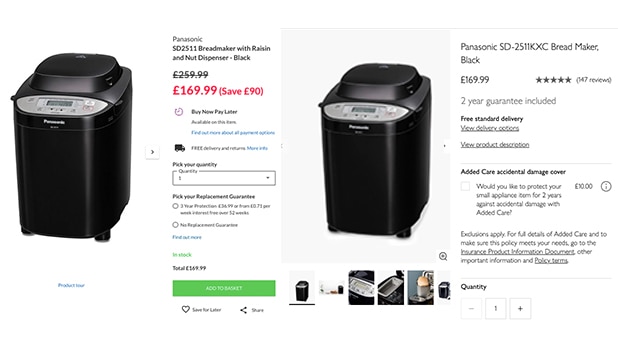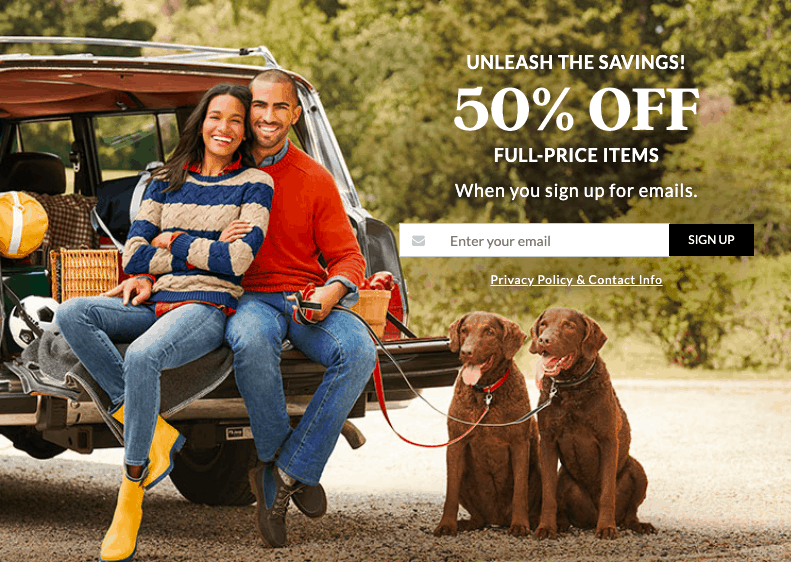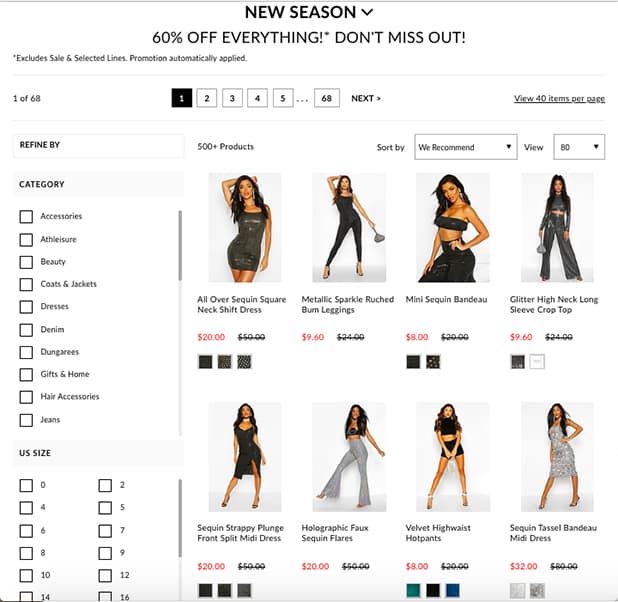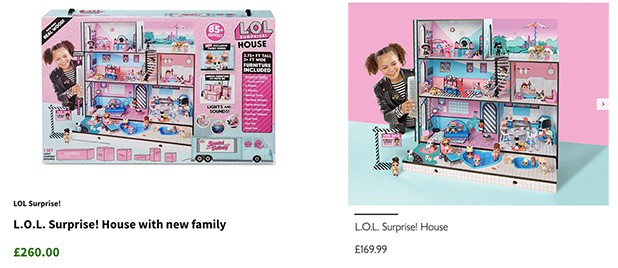A wise man once said, ‘I can’t live with or without you.’ An excellent way to describe an online retailer’s relationship with a discount strategy. When you plan ahead for your discounts with the help of existing discount strategies, you can make sure they are profitable and successful.
As an ecommerce business, selling your products online is a price-sensitive issue. You need to pick the right price to reach the right audience. Offering too many discounts runs the risk of devaluing your products and not offering any cuts to your profits. Before you start with your discount strategy, we advise you to try other methods to boost your sales and profits. Afterward, you can move on to discounts.
You must pay attention to the benefit of discounting entirely, but you can only offer partial discounts because it’ll eventually impair your business. To discover the limits of a successful discount strategy, let’s find out what customers expect from a discount and how it influences their shopping behavior.
How do discounts affect purchasing behavior?
Discounts have an incredibly positive effect on consumer behavior at first glance. But when you go deeper, you start seeing how discounting without a solid strategy can hurt profitability in the long run.
Think of it this way. You recently moved into a new neighborhood and are buying groceries from the local supermarket. Since you moved in, the coconuts have been on sale. For two months, you bought them at $4 with a $2 discount. One day, you go to the supermarket and see that the coconuts are now sold at $6. Would you be happy that the discount lasted that long, or would you be dissatisfied that it ended?
Like every other shopper, you’ll be disappointed. The same rule applies to online shoppers. They get used to the discounted prices so much that they constantly develop tactics to benefit from them.
Instead of developing discount tactics (that you can find in a million other posts), let’s uncover which tactics customers use to make the most out of their discount strategy. This way, we’ll learn the point where a discount benefits your business as much as it does the customer. But more importantly, we’ll learn what’s beyond that point.
Marketers vs. Consumers
What marketers do
Offering discounts to abandoned cart owners.
What consumers do
Intentionally abandoning the cart with the expectation of a discount.
The latest shopping cart abandonment rates show that in March 2023, 72.77% of all online shopping carts failed to reach the checkout stage. Online stores offer discounts to reduce this rate. However, customers are getting accustomed to this strategy. They rely on stores to offer abandoned cart discounts each time and wait for it!

Rather than giving up this useful tactic, determine the customers who formed the habit of leaving the cart. Feel free to leave them out of this type of offer since they are overly price-driven consumers unlikely to build loyalty.
What marketers do
Price anchoring
What consumers do
Price comparison
Discounted prices are usually displayed next to anchor prices. By comparing it to the old, expensive price, stores aim to convince customers that the new price is fair. Often, marketers set the anchor price higher than the actual price to make the deal look better.
But the first thing online retailers must know is how customers use technology to their benefit. Price comparison is as easy as falling off a log now that comparison shopping engines do the work for you.
It means that customers know how others price the same product. Price anchoring works well if your discount offer is reasonable. But don’t rely on inflated anchor prices.

What marketers do
Giving out coupons to all who share e-mail
What consumers do
Giving multiple made-up e-mails
Online stores want shoppers to subscribe to their newsletter, hoping to convert them through successful advertising. However, most shoppers exchange their emails for discounts and unsubscribe right after receiving the coupon. But it’s not the worst part. Some customers give fake emails, further exploiting the discount offer.

Even if no one exploits your offer, offering discounts in exchange for email addresses adds little value to your brand’s image. On the contrary, it hurts your business. Reward programs can be beneficial; however, sharing email information is not a sign of loyalty. Your loyalty program must reward the people who buy from your store.
What marketers do
Constantly offering discounts that target every online shopper
What consumers do
Shop from the store that offers the best deal
Even though online stores offer discounts to convert more customers and eventually build loyalty, most consumers are price-sensitive and go for the best price. With a quick search, they can find the best deals and coupons.
Suppose you are visiting an online store for the first time. Every product is on sale. It seems odd. You leave without buying anything and come to the same store a month later. Not surprisingly, everything is still on sale. What would you think about the original prices? If they already profit from the discounted prices, why are they setting higher original prices?

Discounting is inevitable
All retailers resort to discounting as a fundamental element of their marketing strategy. There is a reason behind it. A discount strategy can:
- Increase your sales revenue,
- Build/improve customer loyalty,
- Convert new shoppers,
- Dispose of old inventory
Moreover, seasonal discounts are the most common ecommerce practice that online retailers have embraced long ago.
Think of a toy store that doesn’t offer discounts at Christmas time.

While at least ten stores sell identical products for under £170, would you be willing to pay an extra £90 for a particular store? If the answer is yes, you must be fiercely loyal to it.
In addition to that, there are particular advantages to various discount strategies. For example, bundled discounts increase average order value, or you can promote a new product with a pre-order discount.
As you can see, there is no escape from discounting. If we can’t escape from it, let’s learn how to do it correctly.
How to do discounting properly
Discounting can be done in several ways. When you discount, it is important to present the offer in a good way. People should feel like they are buying your products at bargain prices. This can be achieved through the right call-to-action sentences and well-structured offers. Here are a few types of discount strategies to try:
- Buy one, get one for free!
- Free delivery
- Cash amount or percentage discounts
- Multi-buy offers (if you buy two products together, they cost less than their separate purchasing price)
- Volume-based discounts (more favorable for B2B customers)
- Gifts over a certain order value
When you start using discounts, it is important to decide on when you will offer them and to whom you will offer them. Let’s further explore how to do discounts properly after we examine what discount pricing is:
Discount pricing definition
Discount pricing, as the name suggests, is a strategy of discounting with a certain percentage of markdown pricing to move old inventory, increase the number of customers, and increase sales. You can see the common discount pricing examples at the end of each season, where the collection changes in clothing, Black Friday, and Christmas.
Avoid continuous discounting
The first thing you must avoid is continuous discounting. You must limit its duration. Otherwise, consumers will always look for discounts. Either your sales volume will drop significantly when the discounts are over, or you’ll have to cut the total prices permanently.
Quick Tip: Ensure that you offer discounts on the special retail days. In that way, you can drive more traffic and save your brand image.
Use rewards
You can reward loyal customers with exclusive offers to express your thankfulness and strengthen their loyalty. Moreover, exclusivity is a way to cope with the tactics we’ve discussed before that extremely price-driven consumers pursue.
Quick Tip: If you want to avoid rewarding loyal customers, you can offer free shipping.
Nudge New Visitors with a Special Deal
When visitors enter your website, they might need more time to be ready to buy. So, offering a special deal at that moment can be a good idea. You can ask them for a small commitment, like inserting their email address in exchange for a discount code.
Quick Tip: You can sell them your value by only asking for their email address for your newsletter without offering a discount.
Create Early-Bird Discounts for New Products
When you launch a new product in your online store, you probably want to increase sales. You can promote your products before you launch them for a pre-order discount strategy. Doing it makes the offer seem more exclusive, which can drive more traffic to the new product.
Quick Tip: You can create scarcity by limiting the discount to the first 20 orders for your new products.
Retarget Existing Customers
Acquiring new customers is five times more costly than retaining existing customers. That’s why you can retarget your existing customers with special emails. Send them special discounts to get them into your store. Your email marketing emails or ads are a way-to-go tactic you can use immediately.
You can discount on different platforms as well. If your online vendor on Shopify is getting no turnouts while your online retailing website does, you can have different prices for each to gain more customers on both platforms.
Quick Tip: You can segment your emails by developing a deeper insight into your customers’ buying journeys. That way, you can send discounts to customers in the decision stage.
Try economy pricing strategy
Let’s look at economy pricing definition first. Economy pricing is the practice of setting budget friendly prices for products or services to attract consumers which is commonly seen in industries where production costs are low and it is important to maximize the sales volume. This aim here is to not only lure price-sensitive customers to the store but to keep them returning as well.
Quick Tip: Economy pricing strategy is useful when your business have simplified its operations by optimizing supply chains and reducing overhead costs. It might be great to compete against higher-priced alternatives, try out different price method in time to avoid being perceived as low-quality since constant low price points will affect your customers’ brand perception.
Announcing your discounts
After you decide on your discount strategies, the last important step will be announcing your discounts. You may use social media and target your custom audiences if needed. Consider mentioning your discounts through e-mails, weekly subscription-based catalogs, or on your website through banners, retargeting ads, etc. You can utilize your YouTube account or other accounts that can share your video content that provides information regarding the discounts. There are no limits at this point.
Final Words
Discount strategy is challenging yet rewarding. It’s challenging because its duration, targeting, and amount matter. To top it all, customers are now experts in discounts and utilize the opportunities with tactics they’ve developed collectively.
Rather than focusing on well-known discount strategies, we’ve focused on the traps SMBs fall into. Consumers:
- Intentionally abandon shopping carts to get discounts
- Easily detect pumped-up anchor prices and see the real discount rate
- Give multiple made-up emails to get multiple discounts
- Get annoyed by permanent discounts at a store
All in all, remember that discount strategies should not be implemented randomly. They should have a goal, an audience to affect, and certain conditions along the way. There is a structure in its presentation, and it can be utilized according to a different set of audiences.

Comments (2)
Michael Day
28.01.2021Love this! Thank you for sharing!
Prisync Team
29.01.2021Thank you for the great comment, Michael!
Comments are closed.